Filler-Free Probiotics: The Science-Backed Path to Optimal Gut Health
Your gut health influences everything from digestion and immunity to mood and energy levels. While the probiotic supplement industry has exploded in recent years, not all probiotics deliver what they promise. Many popular brands fill their capsules with unnecessary additives that can actually interfere with the beneficial bacteria you're trying to support. Filler-free probiotics represent a cleaner, more effective approach to digestive wellness—delivering maximum concentrations of beneficial bacteria without the synthetic fillers that compromise their effectiveness.
This comprehensive guide explores the science behind filler-free probiotic formulations, why fillers like microcrystalline cellulose can harm your gut health, and how multi-strain probiotics with organic prebiotics provide superior digestive support compared to conventional options.
Key Takeaways
- Filler-free probiotics deliver higher concentrations of beneficial bacteria without synthetic additives that reduce effectiveness or cause digestive discomfort
- Microcrystalline cellulose (MCC) is a non-fermentable filler that research shows provides no prebiotic benefit and may actually interfere with probiotic survival and gut bacterial balance[1]
- Multi-strain formulations consistently outperform single-strain probiotics for comprehensive digestive support through synergistic bacterial activity and broader colonization[2]
- Organic prebiotics like inulin and acacia fiber are essential for feeding beneficial bacteria and significantly increase populations of Bifidobacteria and Lactobacilli in clinical studies[3][4]
- Soil-Based Organisms (SBOs) offer unique advantages including superior stomach acid survival, longer shelf life, and complementary mechanisms to traditional probiotics[5]
- Short-chain fatty acids produced by gut bacteria provide anti-inflammatory, metabolic, and neuroprotective benefits throughout the body[6]
- MicroBiome Restore combines 26 probiotic strains with 9 organic prebiotics in a truly filler-free formula designed for maximum gut health support
1. Understanding Fillers: The Hidden Problem in Probiotic Supplements
Most probiotic supplements contain synthetic fillers and flow agents that serve manufacturing purposes but provide zero health benefits—and may actually harm your digestive system. The most common culprit is microcrystalline cellulose (MCC), a wood-derived compound used to bulk up capsules and improve manufacturing efficiency.
Why Manufacturers Use Fillers
Probiotic bacteria occupy very little physical space. A single capsule containing billions of bacterial cells still leaves significant empty volume. Rather than filling this space with additional beneficial ingredients like prebiotics, enzymes, or trace minerals, many manufacturers opt for cheap fillers like MCC. This reduces production complexity and costs while allowing them to maintain lower retail prices.
The Science on Microcrystalline Cellulose
Research published in Microbiome examined the effects of microcrystalline cellulose compared to fermentable fibers. The study found that MCC is "microbiota-non-accessible" meaning gut bacteria cannot ferment it to produce beneficial short-chain fatty acids. Unlike true prebiotic fibers, MCC provided no metabolic or health benefits in the six-week clinical trial.[1]
Additional research in Gut Microbes demonstrated that dietary cellulose, when absent from the diet, disrupted age-related diversification of the intestinal microbiota, leaving it in an immature state. While this study examined cellulose deficiency rather than MCC supplementation specifically, it highlights cellulose's complex relationship with gut bacteria.[7]
How MCC May Interfere with Probiotics
While MCC is generally recognized as safe for consumption, several mechanisms suggest it may reduce probiotic effectiveness:
- Physical displacement: MCC occupies space that could be filled with prebiotics or additional probiotic strains
- Potential digestive irritation: Some individuals experience bloating, gas, or constipation from cellulose-based fillers, particularly at high doses consumed regularly
- Nutrient absorption interference: Studies suggest cellulose-based fillers may create a water-repelling effect around active ingredients, potentially affecting absorption[8]
- Zero prebiotic value: Unlike fermentable fibers, MCC provides no food for beneficial bacteria and produces no health-promoting metabolites
By choosing probiotics without MCC or other unnecessary additives, you ensure maximum space for beneficial bacteria and their supporting nutrients—nothing wasted on inert substances your body must process and eliminate.
2. The Power of Filler-Free Probiotic Formulations
Filler-free probiotics like MicroBiome Restore represent a fundamentally different approach to digestive health supplementation. Instead of padding capsules with cellulose and synthetic flow agents, every milligram serves a purpose in supporting your gut microbiome.
What Makes Filler-Free Probiotics Superior
- Higher beneficial bacteria concentrations: More capsule volume dedicated to active probiotic strains rather than inert fillers
- Enhanced bioavailability: Without water-repelling fillers creating barriers, beneficial bacteria reach your intestines more effectively
- Reduced allergic reaction risk: Fewer ingredients mean fewer potential allergens or sensitivities, particularly important for those with food intolerances
- Targeted digestive support: Each ingredient serves a specific function—probiotics, prebiotics, and cofactors working synergistically
- Faster, more noticeable results: Clean formulations allow beneficial bacteria to colonize and produce effects more rapidly
- Better long-term tolerance: Absence of irritating fillers means you can take probiotics consistently without digestive discomfort
The Purity Advantage
When you remove unnecessary fillers, you create room for ingredients that actively enhance probiotic function. MicroBiome Restore fills this space with 9 certified organic prebiotic fibers and over 80 trace minerals—compounds that feed beneficial bacteria and provide the nutritional cofactors they need to thrive in your digestive tract.
3. Multi-Strain Probiotics: Synergy Through Diversity
Your gut hosts over 1,000 different bacterial species forming a complex ecosystem. Just as a diverse natural ecosystem proves more resilient and productive than a monoculture, a diverse gut microbiome significantly outperforms a limited one. This principle extends directly to probiotic supplementation.
The Science Supporting Multi-Strain Superiority
A comprehensive review published in Biology examined the efficacy of single-strain versus multi-strain probiotics. The researchers found that multi-strain probiotics demonstrated superior pathogen inhibition and stress tolerance compared to their individual components. The study specifically noted that multi-strain formulations produced larger inhibition zones against common pathogens and showed enhanced biofilm formation—a key factor in successful gut colonization.[2]
Additional research in Biology examined strain-specific benefits and concluded that while some single strains excel at specific functions, multi-strain combinations provide broader spectrum benefits through complementary mechanisms and metabolite production.[9]
Mechanisms of Multi-Strain Synergy
- Complementary colonization sites: Different bacterial strains prefer different intestinal locations. Lactobacillus species predominantly colonize the small intestine, while Bifidobacterium species dominate the colon. Using both ensures comprehensive coverage throughout your digestive tract
- Diverse metabolite production: Each strain produces unique compounds—organic acids, vitamins, antimicrobial peptides, and signaling molecules. More strains equals a broader range of beneficial metabolites supporting various aspects of health
- Cross-feeding networks: Some bacteria produce compounds that feed other species, creating cooperative relationships that amplify overall benefits. These synergistic interactions only occur in multi-strain environments
- Resilience and redundancy: If certain strains fail to colonize in your particular gut environment, others can compensate, dramatically increasing the likelihood of positive outcomes regardless of individual microbiome variations
- Broader pathogen inhibition: Different strains combat different harmful bacteria through various mechanisms, providing more comprehensive protection against digestive pathogens
Research Spotlight: Multi-Strain vs. Single-Strain Efficacy
A 2021 systematic review published in Journal of Clinical Gastroenterology compared the pooled efficacy of single-strain probiotics versus multi-strain mixtures across eight disease indications. The researchers found that in most cases, multi-strain mixtures were equivalent to or more effective than single strains. Notably, a mixture containing L. rhamnosus and B. lactis proved significantly more effective for H. pylori eradication than L. rhamnosus alone, demonstrating clear synergistic benefit.[10]
4. The BioPhysics Essentials Advantage: 26 Strains + 9 Organic Prebiotics
MicroBiome Restore delivers one of the most comprehensive probiotic formulations available, combining diversity, purity, and scientific validation in a truly filler-free formula.
The Complete Formulation
26 Live Probiotic Strains:
- 21 Traditional Probiotics including extensively researched species like Lactobacillus acidophilus, Bifidobacterium longum, Lactobacillus rhamnosus, Bifidobacterium lactis, Lactobacillus plantarum, Lactobacillus casei, and Bifidobacterium bifidum
- 5 Soil-Based Organisms (spore-forming Bacillus species) providing enhanced survivability and complementary mechanisms
- 15 Billion CFU per serving optimized for effectiveness without overwhelming sensitive digestive systems
9 Certified Organic Prebiotics:
- Maitake Mushroom: High-fiber functional food that stimulates beneficial bacteria growth while providing immune-supporting proteoglycans
- Fig Fruit: Rich in prebiotic fiber, antioxidants, and compounds that reduce digestive inflammation
- Jerusalem Artichoke: Contains inulin, one of the most extensively studied prebiotics for supporting Bifidobacteria populations[3]
- Acacia Senegal Gum: Slowly fermented soluble fiber that enhances beneficial bacteria without causing the gas and bloating associated with faster-fermenting prebiotics[4]
- Norwegian Kelp, Bladderwrack, Oarweed: Marine vegetables providing iodine, diverse trace minerals, and fucoidan compounds for gut lining support
80+ Trace Minerals from organic sea vegetables ensure bacteria receive complete nutritional support without competing with your body for essential micronutrients.
What Sets MicroBiome Restore Apart
Zero Harmful Fillers
Unlike most probiotics, MicroBiome Restore contains:
- No microcrystalline cellulose (MCC)
- No magnesium stearate
- No synthetic flow agents or silica
- No artificial colors, flavors, or preservatives
Every ingredient serves a specific purpose in supporting your gut microbiome—nothing wasted on manufacturing conveniences.
Innovative Fermented Pullulan Capsule: The capsule itself functions as a prebiotic, breaking down in the large intestine where probiotics colonize rather than the stomach. This delayed-release mechanism maximizes bacterial survival while the pullulan material feeds beneficial bacteria.
Shelf-Stable Technology: Advanced strain preparation and encapsulation ensure bacterial viability without refrigeration—crucial for consistent supplementation during travel and busy lifestyles. Potency is guaranteed through the expiration date when stored properly.
Third-Party Tested: Every batch undergoes rigorous testing for purity, potency, and absence of contaminants including heavy metals—essential quality standards for daily supplementation.
5. Soil-Based Organisms: Nature's Resilient Probiotics
Soil-Based Organisms (SBOs) represent a unique category of probiotics with properties distinct from traditional Lactobacillus and Bifidobacterium species. For millennia, humans consumed these hardy bacteria through vegetables grown in healthy soil, well water, and environmental exposure—microbial relationships largely lost in our modern sterilized food system.
What Makes SBOs Different
SBOs like Bacillus coagulans and Bacillus subtilis form protective spores—microscopic seed-like structures with tough outer coatings that allow them to survive extreme conditions. This spore-forming ability provides several advantages:
- Superior stomach acid survival: Spores easily withstand the harsh acidic environment of the stomach, arriving 100% viable in the intestines where they activate. Research confirms spore-forming strains demonstrate significantly higher survival rates than non-spore-forming probiotics[5]
- Extended shelf life without refrigeration: Spores remain stable at room temperature for years, eliminating refrigeration requirements and maintaining full potency through the expiration date
- Resistance to antibiotics and processing: The protective spore coating provides resistance to many antibiotics and survives food processing conditions that would destroy traditional probiotics
- Complementary mechanisms: SBOs work through different pathways than Lactobacillus and Bifidobacterium species, addressing different aspects of gut health
Clinical Evidence for Soil-Based Probiotics
Research on Bacillus coagulans published in multiple clinical trials demonstrates specific health benefits:
- IBS symptom reduction: Specific Bacillus coagulans strains significantly improved bloating, abdominal pain, and bowel irregularity in irritable bowel syndrome patients[11]
- Digestive comfort: Studies show Bacillus species help maintain the ecological balance of intestinal microflora, reducing gas, bloating, and digestive discomfort
- Immune support: Bacillus subtilis has been shown to stimulate immune cell production and promote positive immune responses[12]
- SIBO management: Research suggests certain Bacillus strains may help with Small Intestinal Bacterial Overgrowth by supporting proper bacterial balance without exacerbating symptoms[13]
Safety Profile of Soil-Based Organisms
Bacillus coagulans and Bacillus subtilis have extensive safety documentation. Both possess GRAS (Generally Recognized as Safe) status in the United States and have been consumed safely through fermented foods for centuries. Multiple toxicology studies confirm these strains are non-pathogenic, non-toxigenic, and safe for daily consumption at recommended doses.[5]
6. The Essential Role of Organic Prebiotics
Probiotics are living organisms that require nourishment to survive, multiply, and produce their beneficial effects. Prebiotics—non-digestible fibers that feed beneficial bacteria—are just as crucial as the probiotics themselves.
Why Organic Prebiotics Matter
A comprehensive review published in Nutrients examined the effects of prebiotic supplementation on gut microbiota. The research demonstrated that inulin-type prebiotics significantly increased populations of beneficial Bifidobacteria and Lactobacilli while producing health-promoting short-chain fatty acids.[3]
Additional research in ACS Omega specifically examined acacia gum and found it promoted Bifidobacteria proliferation similar to fructo-oligosaccharides while inhibiting Clostridium histolyticum, bacteria commonly associated with gut dysbiosis. Notably, acacia gum demonstrated slower fermentation than shorter-chain prebiotics, reducing gas and bloating—a common complaint with faster-fermenting fibers.[4]
Key Benefits of Organic Prebiotic Fibers
- Selective bacterial nourishment: Prebiotics preferentially feed beneficial Bifidobacteria and Lactobacilli rather than potentially harmful bacteria
- Short-chain fatty acid production: As beneficial bacteria ferment prebiotic fibers, they produce acetate, propionate, and butyrate—compounds with anti-inflammatory, metabolic, and neuroprotective properties throughout the body[6]
- Enhanced mineral absorption: Certain prebiotics improve absorption of calcium, magnesium, and other essential minerals[14]
- Gut barrier strengthening: Prebiotic fermentation products support intestinal barrier integrity, reducing permeability ("leaky gut") and systemic inflammation[15]
- Immune system modulation: Prebiotics directly and indirectly influence immune function through their effects on beneficial bacteria and production of immunomodulatory compounds[14]
The Synbiotic Advantage
Formulations combining probiotics with prebiotics are called "synbiotics." Research shows synbiotic formulations produce superior outcomes compared to probiotics alone, as the prebiotics provide immediate nourishment for the probiotic bacteria while also feeding your existing beneficial gut microbes. MicroBiome Restore's combination of 26 probiotic strains with 9 organic prebiotics creates a complete synbiotic system for optimal gut health.
7. Short-Chain Fatty Acids: The Gut-Health Messengers
When beneficial gut bacteria ferment prebiotic fibers, they produce short-chain fatty acids (SCFAs)—small organic compounds with profound effects throughout your body. The three primary SCFAs—acetate, propionate, and butyrate—account for approximately 95% of SCFAs produced in the colon at a typical ratio of 60:20:20.[6]
The Science of SCFAs
A comprehensive review in Foods examined the health benefits and mechanisms of short-chain fatty acids. The research documented anti-inflammatory, immunoregulatory, anti-obesity, anti-diabetes, anticancer, cardiovascular protective, hepatoprotective, and neuroprotective activities of SCFAs across multiple organ systems.[6]
Key SCFA Benefits
Butyrate (20% of SCFAs):
- Primary energy source for colonocytes (intestinal lining cells), promoting healthy cell differentiation and proliferation
- Powerful anti-inflammatory effects, reducing pro-inflammatory cytokines and enhancing anti-inflammatory mediators
- Strengthens intestinal barrier function, reducing "leaky gut" and systemic inflammation
- Improves insulin sensitivity and glucose metabolism
- Neuroprotective effects through gut-brain axis communication[16]
Propionate (20% of SCFAs):
- Regulates appetite through gut hormone modulation (peptide YY and GLP-1)
- Supports healthy lipid metabolism and cholesterol management
- Anti-obesity effects in clinical studies
- Hepatoprotective properties supporting liver function[6]
Acetate (60% of SCFAs):
- Enters systemic circulation, serving as an energy substrate for peripheral tissues including the brain
- Reduces appetite and food intake through hypothalamic signaling
- Anti-inflammatory effects throughout the body
- Supports cardiovascular health through blood pressure regulation[6]
The Gut-Brain Connection
Research published in Frontiers in Endocrinology demonstrates that SCFAs play crucial roles in gut-brain communication, influencing mood, cognitive function, and neurological health. SCFAs cross the blood-brain barrier and directly modulate brain function, while also signaling through the vagus nerve and influencing neurotransmitter production in the gut. This helps explain why gut health profoundly affects mental wellness.[16]
8. Comparing Filler-Free to Conventional Probiotics
MicroBiome Restore vs. Typical Probiotic Supplements
| Feature | MicroBiome Restore | Typical Probiotic |
|---|---|---|
| Probiotic Strains | 26 diverse strains | 1-5 strains |
| Organic Prebiotics | 9 certified organic | 0-2 (often synthetic) |
| Microcrystalline Cellulose | None | Often primary filler |
| Magnesium Stearate | None | Common flow agent |
| Soil-Based Organisms | 5 SBO strains | Rarely included |
| Trace Minerals | 80+ from organic sources | None |
| Capsule Technology | Fermented pullulan (prebiotic) | Gelatin or HPMC |
| Shelf Stability | Room temperature | Often requires refrigeration |
The comparison clearly demonstrates that filler-free, multi-strain formulations with organic prebiotics provide comprehensive support that conventional probiotics simply cannot match. Every component works synergistically to create optimal conditions for beneficial bacteria to thrive and produce their health-promoting effects.
9. How Filler-Free Probiotics Support Overall Wellness
While digestive health represents the most obvious benefit of probiotic supplementation, the effects extend far beyond the gut. Your microbiome influences virtually every system in your body through multiple mechanisms.
Digestive System Benefits
- Improved nutrient absorption: Beneficial bacteria enhance intestinal barrier function and produce enzymes that aid nutrient breakdown and uptake
- Reduced bloating and gas: Proper bacterial balance prevents excessive fermentation and gas production from undigested carbohydrates
- Regular bowel movements: Probiotics help regulate intestinal motility and stool consistency
- Relief from IBS symptoms: Clinical studies demonstrate significant symptom improvement in irritable bowel syndrome patients[11]
- Support for inflammatory bowel conditions: Anti-inflammatory SCFAs and immune modulation may help manage IBD symptoms[17]
Immune System Enhancement
Approximately 70% of your immune system resides in your gut-associated lymphoid tissue (GALT). Beneficial bacteria train and modulate immune cells, helping them distinguish between harmless substances and genuine threats. Research shows probiotics:
- Enhance production of secretory IgA, your first line of immune defense[14]
- Modulate inflammatory responses, reducing excessive inflammation while maintaining appropriate immune vigilance
- Support respiratory health and reduce cold/flu duration in clinical studies[12]
- May help prevent or manage allergic conditions through immune system education
Mental Health and Cognitive Function
The gut-brain axis represents bidirectional communication between your digestive system and central nervous system. Gut bacteria influence brain function through:
- Neurotransmitter production: Gut bacteria produce or influence production of serotonin, GABA, dopamine, and other mood-regulating compounds[16]
- Vagal nerve signaling: The vagus nerve provides a direct communication pathway from gut to brain
- SCFA effects on brain function: Butyrate and other SCFAs cross the blood-brain barrier, providing neuroprotective effects
- Inflammation reduction: Systemic inflammation from gut dysbiosis affects mood and cognitive function; probiotics help reduce this inflammatory burden
Metabolic Health Support
- Weight management: Specific bacterial populations influence metabolism, appetite regulation, and fat storage
- Blood sugar regulation: SCFAs improve insulin sensitivity and glucose homeostasis
- Cholesterol management: Certain probiotic strains help maintain healthy lipid profiles[6]
- Energy production: SCFAs contribute approximately 10% of daily energy requirements
Comprehensive Wellness Through Gut Health
By supporting a diverse, balanced gut microbiome with filler-free probiotics, you're investing in whole-body health. The effects ripple outward from your digestive system, influencing immunity, mood, metabolism, skin health, and more. This explains why so many people report feeling dramatically better overall—not just digestively—after optimizing their gut microbiome. This is especially important for those with sensitive digestive systems or conditions like small intestinal bacterial overgrowth (SIBO), where unnecessary additives may exacerbate symptoms.
10. Making the Switch to Filler-Free Probiotics
Transitioning to a high-quality, filler-free probiotic formulation is straightforward, but a few guidelines ensure optimal results:
Getting Started
- Begin with the recommended dose: Start with the suggested serving size on the label. MicroBiome Restore provides 15 billion CFU per serving—an optimal dose for most individuals
- Take consistently: Daily supplementation is crucial for maintaining beneficial bacterial populations. Take your probiotic at approximately the same time each day to establish a routine
- Consider timing: While probiotics can be taken any time, many people find taking them with a meal improves tolerance and effectiveness
- Stay hydrated: Adequate water intake supports digestive function and helps beneficial bacteria thrive
- Eat prebiotic-rich foods: Complement supplementation with dietary sources of prebiotic fiber—onions, garlic, asparagus, bananas, oats, and other whole plant foods
What to Expect
Timeline for benefits:
- Days 1-7: Some people notice improved regularity and reduced bloating within the first week
- Weeks 2-4: More consistent digestive comfort, energy improvements, and reduction in gas/bloating
- Weeks 4-8: Noticeable improvements in overall wellbeing, immune function, and possibly mood or skin health
- 8+ weeks: Full microbiome remodeling with sustained benefits across multiple health dimensions
Temporary adjustment period: Some individuals experience mild digestive changes during the first few days as their microbiome adjusts. This typically resolves quickly as beneficial bacteria establish themselves. If symptoms persist beyond a week, consider reducing the dose temporarily, then gradually increasing.
Maximizing Effectiveness
- Avoid unnecessary antibiotics: When possible, avoid antibiotics unless medically necessary, as they indiscriminately destroy both harmful and beneficial bacteria
- Minimize sugar and processed foods: These feed potentially harmful bacteria and can counteract probiotic benefits
- Include fermented foods: Yogurt, kefir, sauerkraut, kimchi, and other fermented foods provide complementary bacterial diversity
- Manage stress: Chronic stress negatively impacts gut bacteria. Practice stress-reduction techniques like meditation, exercise, or yoga
- Get adequate sleep: Poor sleep disrupts gut microbiome composition. Aim for 7-9 hours nightly
Experience the Filler-Free Difference
Ready to transform your gut health with a truly comprehensive, filler-free formula? MicroBiome Restore delivers 26 diverse probiotic strains, 9 organic prebiotics, and 80+ trace minerals—everything your gut needs to thrive, nothing it doesn't.
Conclusion: Invest in Your Gut Health with Filler-Free Probiotics
Your gut microbiome represents one of the most important factors in your overall health and wellbeing. The bacterial ecosystem living in your digestive tract influences everything from nutrient absorption and immunity to mood, metabolism, and disease risk. Supporting this ecosystem with high-quality, evidence-based probiotics provides one of the most effective interventions for optimizing health.
The difference between filler-free probiotics and conventional options is substantial. By eliminating unnecessary additives like microcrystalline cellulose and magnesium stearate, you maximize space for beneficial bacteria, prebiotics, and supportive nutrients. Multi-strain formulations provide comprehensive support through synergistic bacterial activities. Organic prebiotics feed beneficial bacteria and enable production of health-promoting short-chain fatty acids. Soil-based organisms offer unique resilience and complementary mechanisms.
MicroBiome Restore embodies these principles in a thoughtfully formulated product designed for maximum gut health support. With 26 probiotic strains, 9 organic prebiotics, 80+ trace minerals, and zero fillers or unnecessary additives, it represents a comprehensive approach to digestive wellness that conventional probiotics simply cannot match.
Your gut health affects your whole-body health. Make the switch to filler-free probiotics and experience the difference that quality, purity, and scientific formulation can make.
Explore the Complete Gut Essentials Protocol →
Scientific References
- Johnson, L. P., et al. (2022). Elucidating the role of the gut microbiota in the physiological effects of dietary fiber. Microbiome, 10, Article 77. https://doi.org/10.1186/s40168-022-01248-5
- Cheng, Y., et al. (2022). Efficacy of single and multi-strain probiotics on in vitro strain compatibility, pathogen inhibition, biofilm formation capability, and stress tolerance. Biology, 11(11), 1644. https://doi.org/10.3390/biology11111644
- Slavin, J. (2013). Fiber and prebiotics: Mechanisms and health benefits. Nutrients, 5(4), 1417-1435. https://doi.org/10.3390/nu5041417
- Ariffin, F., et al. (2021). Manipulation of gut microbiota using acacia gum polysaccharide. ACS Omega, 6(28), 17782-17797. https://doi.org/10.1021/acsomega.1c00302
- Elshaghabee, F. M. F., et al. (2017). Bacillus as potential probiotics: Status, concerns, and future perspectives. Frontiers in Microbiology, 8, 1490. https://doi.org/10.3389/fmicb.2017.01490
- Liu, J., et al. (2022). Health benefits and side effects of short-chain fatty acids. Foods, 11(18), 2863. https://doi.org/10.3390/foods11182863
- Desai, M. S., et al. (2016). Dietary cellulose induces anti-inflammatory immunity and transcriptional programs via maturation of the intestinal microbiota. Gut Microbes, 7(5), 380-389. https://doi.org/10.1080/19490976.2016.1198798
- Dahl, W. J., et al. (2016). Health benefits of dietary fiber. Nutrition Reviews, 74(2), 131-147. Referenced in Non-GMO Project supplement filler analysis.
- Aiyegoro, O. A., & Okoh, A. I. (2021). Multi-strain probiotics: Synergy among isolates enhances biological activities. Biology, 10(4), 322. https://doi.org/10.3390/biology10040322
- McFarland, L. V., et al. (2021). Efficacy of single-strain probiotics versus multi-strain mixtures: Systematic review of strain and disease specificity. Digestive Diseases and Sciences, 66, 694-704. https://doi.org/10.1007/s10620-020-06244-z
- Majeed, M., et al. (2023). Bacillus coagulans MTCC 5856 has visible impact on the gut health of IBS-constipation individuals: A randomized, double-blind, placebo-controlled study. Journal of Clinical Medicine, 12(2), 345. https://doi.org/10.3390/jcm12020345
- Cutting, S. M. (2021). Generation of spores of Bacillus subtilis in the human small intestine: A potential probiotic mechanism. Frontiers in Microbiology, 12, 715863. https://doi.org/10.3389/fmicb.2021.715863
- Khalighi, A. R., et al. (2014). Evaluating the efficacy of probiotic on treatment in patients with small intestinal bacterial overgrowth (SIBO)–a pilot study. Indian Journal of Medical Research, 140(5), 604-608. PMID: 25579140.
- Rondanelli, M., et al. (2020). Gut health-promoting benefits of a dietary supplement of vitamins with inulin and acacia fibers in rats. Nutrients, 12(8), 2271. https://doi.org/10.3390/nu12082271
- Nakov, G., et al. (2016). Prebiotic effects of inulin and acacia gum. Food and Environment Safety Journal, 14(2), 148-156.
- Silva, Y. P., et al. (2020). The role of short-chain fatty acids from gut microbiota in gut-brain communication. Frontiers in Endocrinology, 11, 25. https://doi.org/10.3389/fendo.2020.00025
- Parada Venegas, D., et al. (2021). Short chain fatty acids and its producing organisms: An overlooked therapy for IBD? EBioMedicine, 66, 103293. https://doi.org/10.1016/j.ebiom.2021.103293



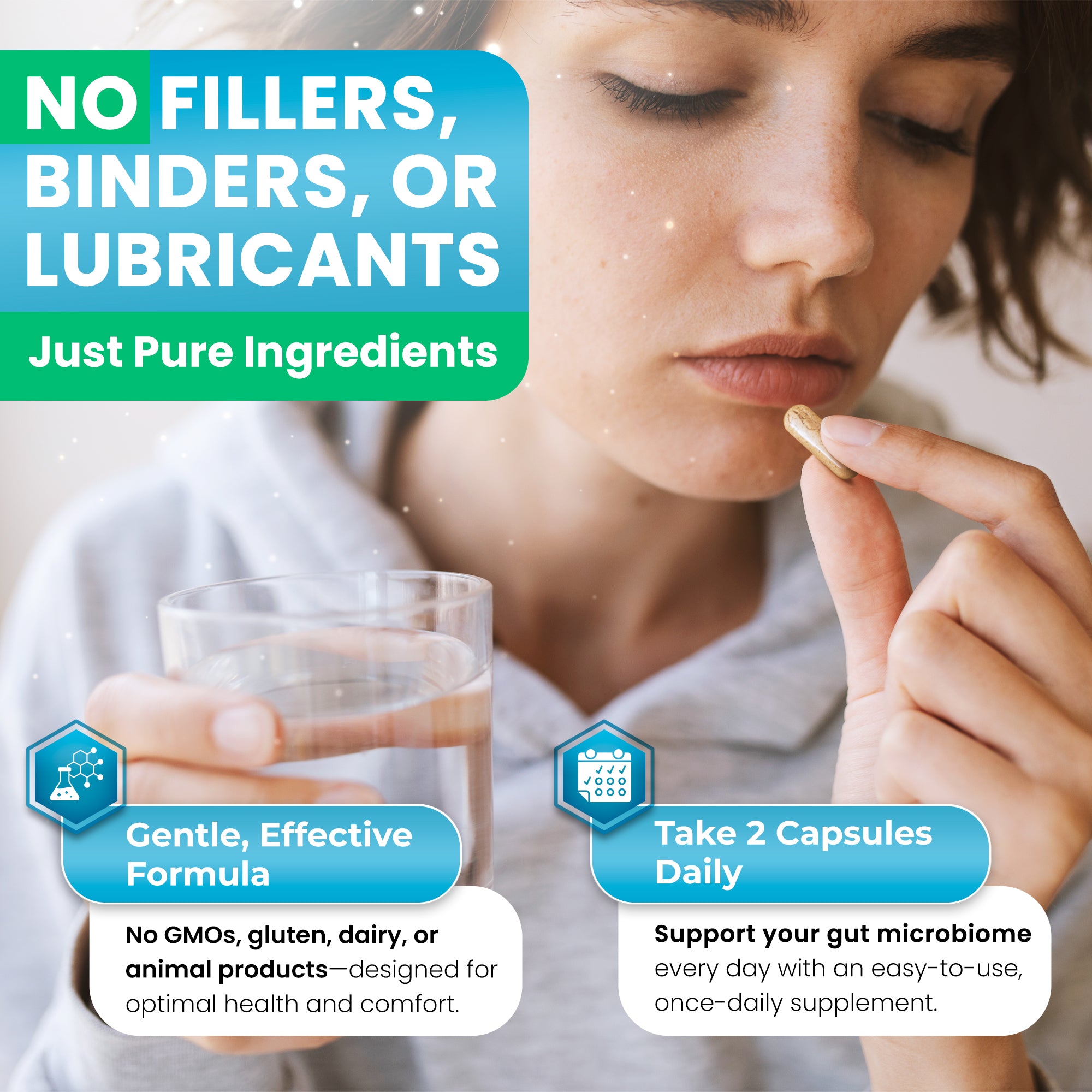
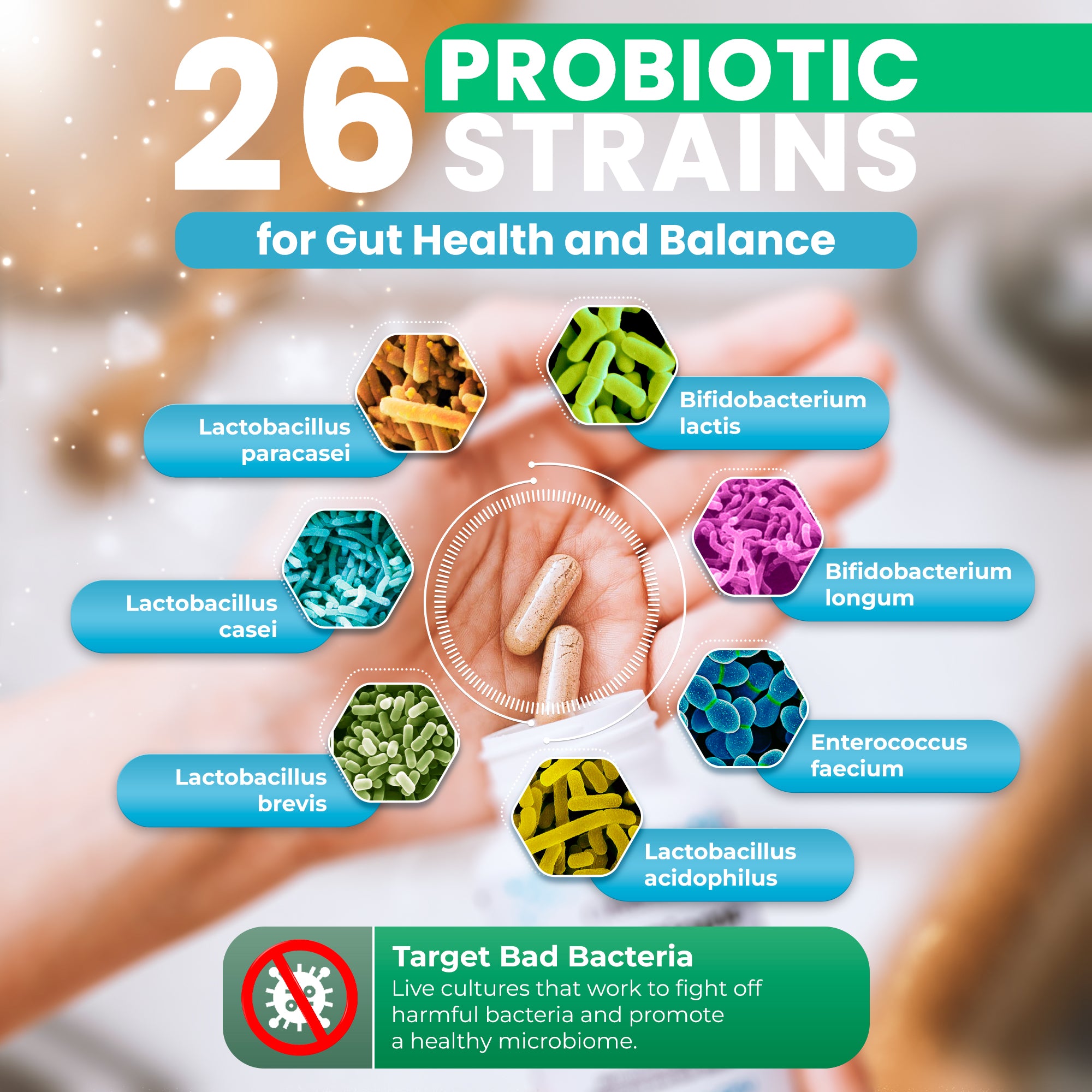
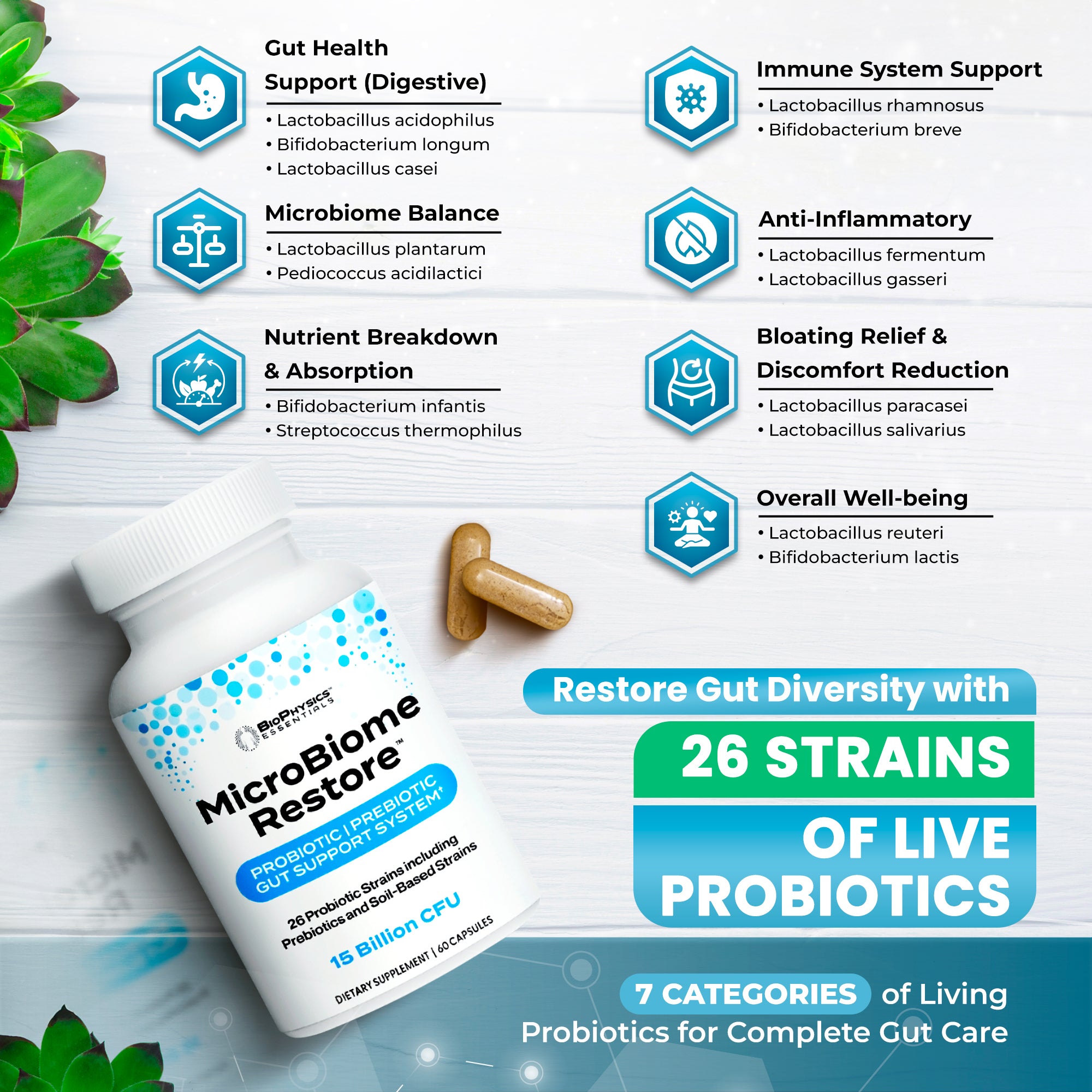
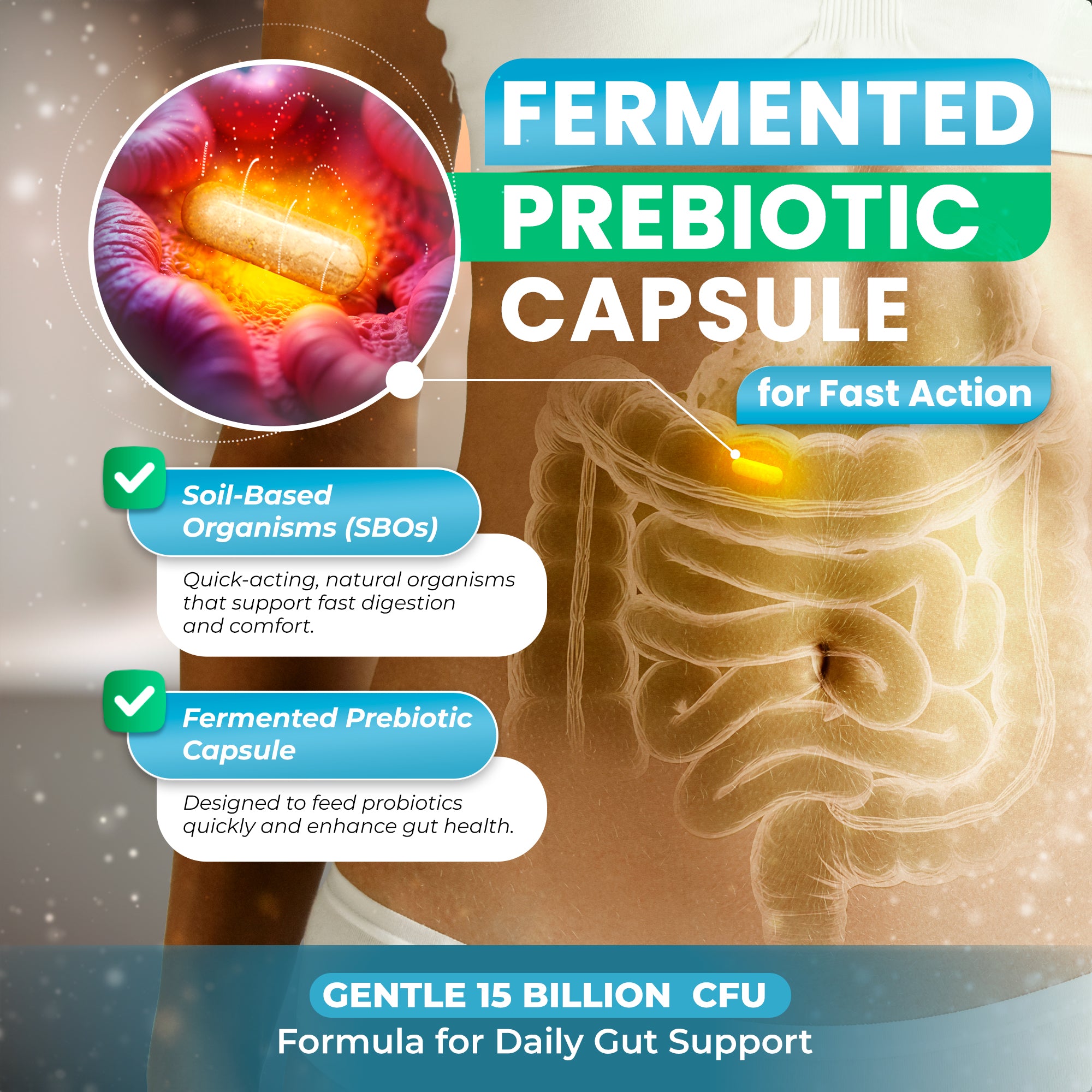
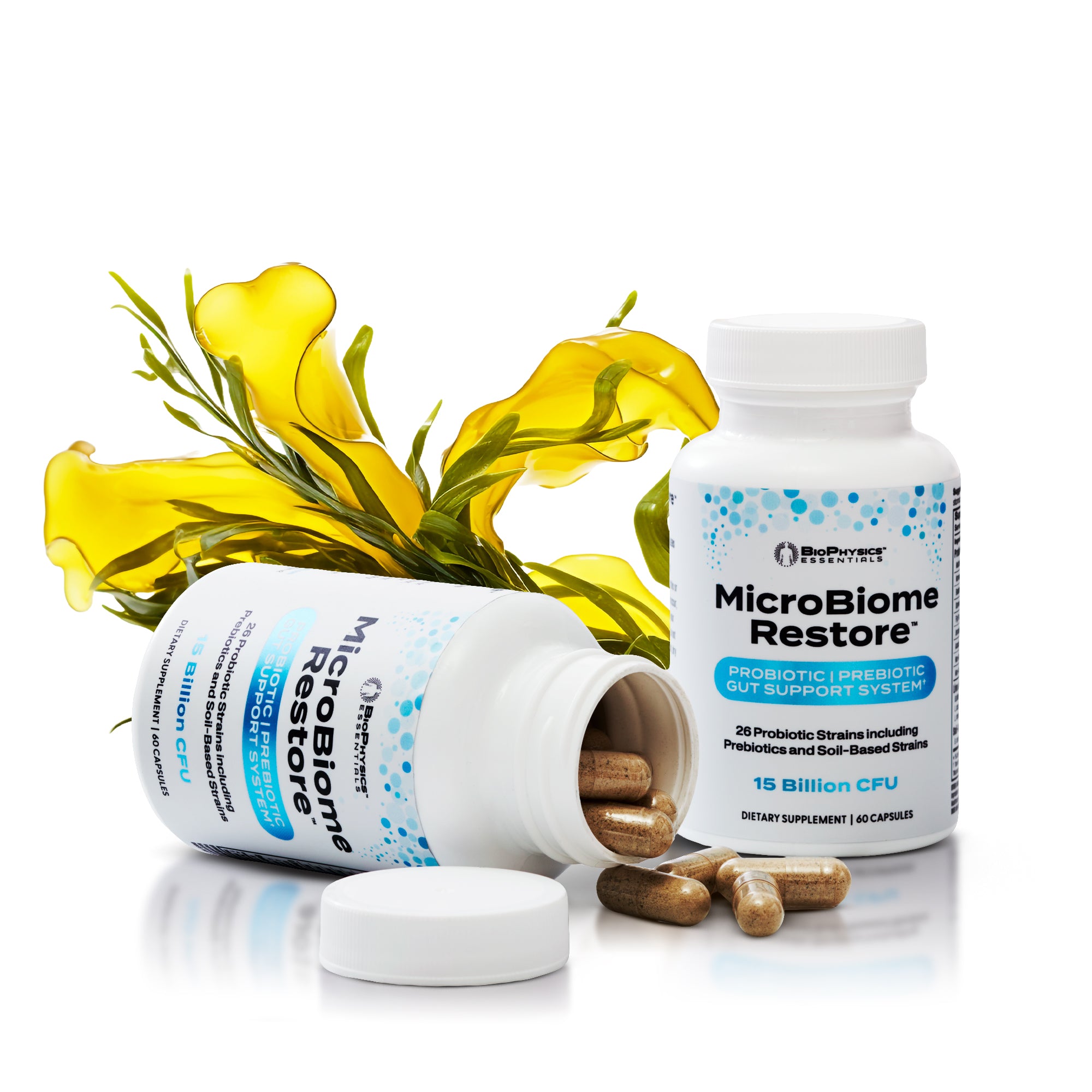
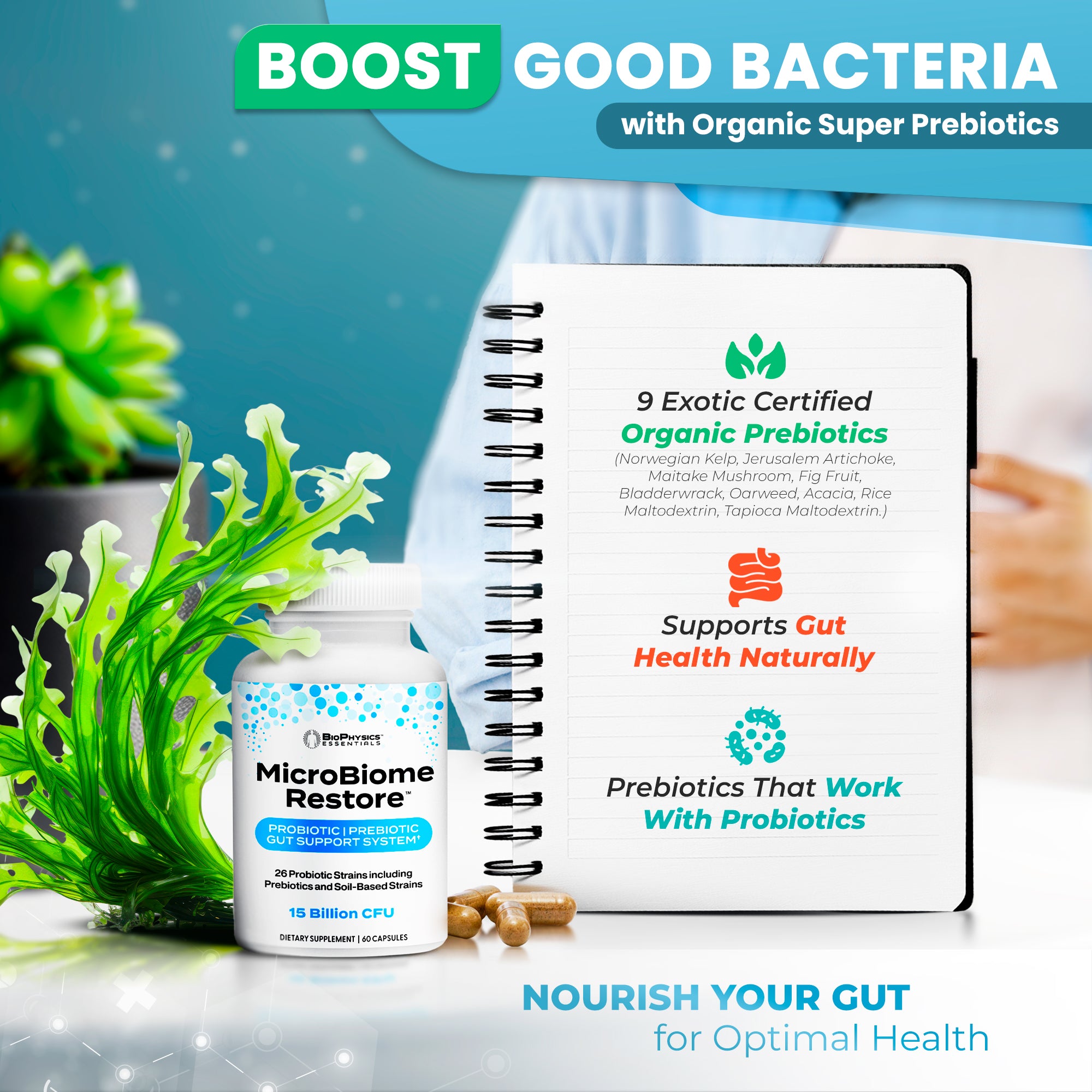


Share and get 15% off!
Simply share this product on one of the following social networks and you will unlock 15% off!